Reply To:
Name - Reply Comment
Last Updated : 2024-04-24 17:01:00

 The fixation to global free market profits with COVID-19 pandemic control efforts became more evident with an international call to establish a “Global Health Threats Council” (GHTC) with a high profile senior global political leadership via a UN General Assembly. This call by a group of ex-heads of States and politicians calling themselves “Independent Panel for Pandemic Preparedness and Response” proves completely out of tune with national issues due to national politics and social culture. Their main proposal is to establish a decision-making body called the GHTC. Main tasks are to develop a global pandemic framework in 06 months and to overcome “vaccine nationalism” and “vaccine diplomacy” to reach the world population with vaccine in 01 year. Their call to establish all this within the UN system and strengthen the WHO itself says, this would be another major cover up of mega profits made by the pharma industry at the expense of the COVID-19 pandemic.
The fixation to global free market profits with COVID-19 pandemic control efforts became more evident with an international call to establish a “Global Health Threats Council” (GHTC) with a high profile senior global political leadership via a UN General Assembly. This call by a group of ex-heads of States and politicians calling themselves “Independent Panel for Pandemic Preparedness and Response” proves completely out of tune with national issues due to national politics and social culture. Their main proposal is to establish a decision-making body called the GHTC. Main tasks are to develop a global pandemic framework in 06 months and to overcome “vaccine nationalism” and “vaccine diplomacy” to reach the world population with vaccine in 01 year. Their call to establish all this within the UN system and strengthen the WHO itself says, this would be another major cover up of mega profits made by the pharma industry at the expense of the COVID-19 pandemic.
SL government is also caught between medical professionals with a similar one track mindset who demand a complete lockdown of the country for at least 02 weeks and a corporate sector that do not accept such lockdowns. What is now being played out with numerous restrictions keeping people indoors with adjustments every now and then is a rough compromise with no set plan.
What is crudely wrong is not how these restrictions are haphazardly carried out on the streets but in the whole approach. Physical isolation of the individual as “Social distancing” with a metre or two the WHO insists is central to the whole pandemic control. A face mask and hand sanitizer were included as added economic value.
Sadly, this 01-metre distancing increased to 02 sometimes, is not based on any scientific learning, but on a traditional assumption. [quote] “Traditionally, transmission of respiratory disease was thought to occur via one of two distinct routes (and this classification is still being used): droplet route for large droplets and aerosol or airborne route for small droplets” [unquote]. On this accepted assumption, [quote] “SARS-CoV-2 virus is currently thought to be spread by ‘contact and droplet’ transmission, though scientists are debating the possibility of airborne transmission” [unquote]. (What is the evidence behind the 2-metre social distancing rule in COVID-19? / Research paper by Zeshan Qureshi, Nicholas Jones and others: Centre for Evidence Based Medicine – 22 June 2020)
Not mere lockdowns anyway
This group of researchers say, social distancing has many other factors at play that should decide the distance. The viral load, number of people around and their activities, ventilation available, indoor and outdoor settings and use of masks are such factors mentioned. “Social distancing should be adapted and used alongside other strategies to reduce transmission…” the research paper says including “prompt isolation of affected individuals”.
What is therefore implied as important is not mere lockdowns, but other measures at community level to separate and quarantine the affected and trace the “first line of contacts”. This requires a clear plan at community level to conduct PCR tests within a short timeframe with an extremely strict “tracing of first line contacts”.
Ironically, head of the Institute for Health Policy Dr. Ravi Rannan-Eliya tweeted last 23 March, “Testing in WP has collapsed partly b’cos staff are doing vaccination and partly lack of MOH prioritisation…..” He also claimed there is widespread transmission continuing. That despite isolation of selected areas and lockdowns.
Incapacities in health service
The Rannan-Eliya tweet says too many things. First, there is no planning for COVID-19 virus control. There is insufficient staff even in the Western Province to handle both PCR testing and vaccination together. This incapacity is due to “lack of MOH prioritisation” which implies we are not into “preventive healthcare”.
After last January , hospital-based health staff were shared for both PCR testing and vaccination, overloading them and reducing PCR tests done per day. Increasing PCR tests in the second half of April to about 25,000 per day became possible when vaccination had to be curtailed due to lack of availability and due to the sudden spike in the pandemic.
Increasing numbers of COVID-19 affected persons requiring hospitalisation from end March, required more resources urgently for the long neglected public health service. Both trained and specialised staff, ventilators, oxygen, more ICU facilities and ambulances for patients became immediate requirements. Government clearly struggling with securing vaccines due to serious financial constraints obtained loans from South Korea (500 million dollars), China (01.5 billion dollars) and later Bangladesh (250 million dollars). The economy had shrunk by 03.6 percent last year. Yet denying financial bankruptcy high profile ministers made public calls for “donors” to improve and expand resources necessary for COVID-19 affected patient treatment at government hospitals.
Privatised curative healthcare
The newly emerged “Independent Panel for Pandemic Preparedness and Response” that wants a UN General Assembly convened, seem to have forgotten that privatisation of healthcare worldwide was with WHO guidance. State funded public health was merely maintained for the poor and the marginalised. But COVID-19 pandemic control becoming a “national responsibility” of governments had to be handled within neglected national healthcare services. Unfortunately, public health systems globally were not capable of carrying the increasing caseloads that came. Thus, further privatising COVID-19 pandemic control is now promoted and canvassed for as the immediate solution though privatised healthcare can only be afforded by the middleclass and the rich.
Guided by the WHO as the apex body of world health and funded by big powers and oligarchies in pharma industry, healthcare is for those with that extra buck in the wallet. Research and development, health policy, international standards and approvals have come to be decided by the same players and aimed at more and bigger profits. Thus, internationally health is focused on “patients per beds per medical doctors” ratio. In short, completely screwed on privatised “curative healthcare” in a dirty free market economy all knowledge, concepts developed, and intellectual thinking are set within a “curative healthcare” system to serve private healthcare.
Over many decades this global system has groomed all practicing professionals, consulting experts and researchers in all branches of medical science to assess, calculate and decide “everything health” within curative healthcare. Thus, solicited and unsolicited “expert advice” to governments and to media remain wholly within their training on curative healthcare and completely ignorant of the importance of “preventive healthcare”.
This has led to a conflict of interest in the preventive healthcare system too at community level with medical practitioners taught and trained to focus on “curative healthcare” appointed as Medical Officers of Health (MOH) for “community healthcare”. As medical practitioners allowed the right for private practice within curative healthcare, they are not attuned to work as MOHs in a community-based preventive healthcare system.
Prevention at community level
Preventive healthcare system was truly community based with a dedicated cadre of Public Health Inspectors (PHI) and Family Health Workers (FHW - earlier designated as Mid-wives) from 1940s till 1970’s and was ignored and neglected thereafter with the shift to free market economy. Even very senior healthcare professionals today have not had the privilege of working with the national health service that gave preventive healthcare due importance and attention, over 50 years ago and before.
In the old days PHIs and FHWs went through neighbourhoods meeting the health needs of the public and family and successfully carrying out immunisation and vaccination programmes, that to date are idolised in international healthcare forums. Thanks to their dedication in community-based preventive healthcare service all communicable diseases like malaria, measles, filariasis and polio were eradicated almost completely before the end of 60th decade was over.
That same efficiency and dedication of the past (very much there still with FHWs though) is not possible now due to neglect during past decades. Yet with around 371 MOH divisions staffed with PHIs and FHWs together totalling over 7,000 they remain the best network of trained healthcare staff that can be deployed immediately for COVID-19 pandemic control. They are known to the community and have an understanding of the terrain they work. This is one healthcare network that can earn “community trust” most essential in controlling the pandemic. “Community trust” has eroded and is almost absent at present in this Colombo centric, regimented approach.
In summing up, what is stressed here is that professional and expert advice trapped in curative healthcare and fixed on lockdowns is unable to provide effective answers for control of the COVID-19 pandemic. We need an immediate shift to preventive healthcare at community level to launch an island wide rapid campaign for PCR testing in identifying affected persons for quarantine and “first line contacts” for isolation. We cannot wait for 06 months more for a “global pandemic framework” and 01 more year to overcome “vaccine nationalism and diplomacy” to begin COVID-19 control the “Independent Panel for Pandemic Preparedness and Response” has proposed. We need immediate preventive measures to reduce numbers requiring hospitalisation, that lockdowns have not been able to achieve during the past year and a half. We NEED A PLAN of ACTION declared publicly for People to know how the COVID-19 pandemic is controlled and how their socio-economic life is accommodated within preventive measures. That remains the most urgent need.
Kusal Perera
2021 May 17
Colombo

Add comment
Comments will be edited (grammar, spelling and slang) and authorized at the discretion of Daily Mirror online. The website also has the right not to publish selected comments.
Reply To:
Name - Reply Comment
US authorities are currently reviewing the manifest of every cargo aboard MV
On March 26, a couple arriving from Thailand was arrested with 88 live animal
According to villagers from Naula-Moragolla out of 105 families 80 can afford
Is the situation in Sri Lanka so grim that locals harbour hope that they coul